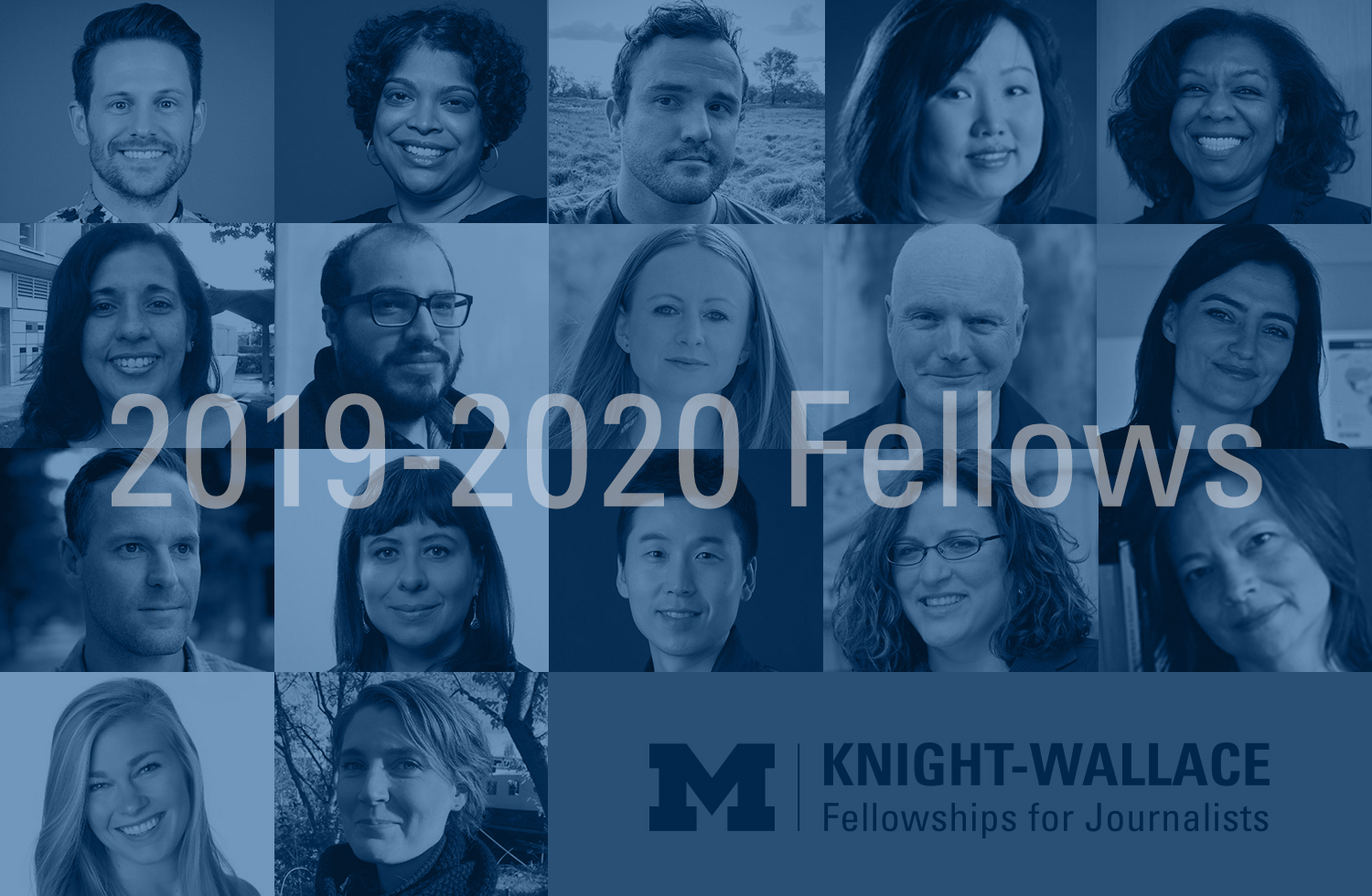The University of Michigan has named 17 journalists as Knight-Wallace Journalism Fellows for the 2019-20 academic year. The accomplished group includes journalists from countries facing extreme political upheaval, cities facing transformational change and organizations confronting shifting public attitudes toward news consumption and the value of the press.
“At a time when the safety and freedom of the press are under threat and newsroom resources are continuing to shrink, it is especially important to provide journalists the space and support to pursue solutions, ” said Wallace House Director Lynette Clemetson. “Whether sharing techniques and tools across borders, experimenting with new storytelling forms or deepening important coverage areas and building public trust, these journalists all share a commitment to forging the path forward. It is a privilege to provide them with this unique opportunity.”
Knight-Wallace Fellows spend an academic year at the University of Michigan in Ann Arbor to pursue individual study plans and to engage in collaborative learning through fellowship seminars, training workshops and travel. Through twice-weekly seminars, Fellows engage with visiting journalists, eminent scholars and creative thinkers from a range of fields. Weeklong international news tours provide broader context to political, economic and social forces shaping their fields of study, and to trends and challenges facing journalism in other countries. In recent years, Fellowship classes visited South Korea, Brazil, Canada, Turkey, Argentina and Russia.
This is the 46th class of journalism fellows at the University of Michigan. The program is based at Wallace House, a gift from the late newsman Mike Wallace and his wife, Mary. Knight-Wallace Fellows receive a stipend of $75,000 for the eight-month academic year. The program is funded through endowment gifts by foundations, news organizations and individuals committed to journalism’s role in fostering an informed and engaged public.
Fellows and their study projects are:
Tommy Andres, Senior Special Projects Producer, Marketplace, American Public Media. Utilizing transmedia production models to craft a single narrative storytelling experience across platforms
Ana Avila, Deputy Director, Newsweek en Español (Mexico City, Mexico). Measuring, tracking and documenting threats and dangers to Mexican journalists for safer newsroom practices
Niala Boodhoo, Host, “The 21st,” Illinois Public Media. Developing a sustainable, replicable business plan for local news podcasts
Maria Byrne, Senior Producer, BBC News (Brussels, Belgium). Expanding coverage of China’s growing ambitions in the world
Jacob Carah, Investigative Reporter and Producer, “Frontline,” PBS, Flint Beat, Flintside (Flint, Michigan), and The Detroit News. Developing new visual design through data analysis, coding and documentary film
Janet Cho, Business Reporter, The Plain Dealer (Cleveland, Ohio) and others. How words and images influence public perception about immigrants and U.S. immigration policy
Chantel Jennings, Senior Writer, The Athletic. Forging editorial partnerships between local news organizations and college newsrooms
Tracie Mauriello, Washington Bureau Chief, Pittsburgh Post-Gazette. Experimentation with points of view and narration techniques in literary journalism
Maurício Meireles, Reporter and Columnist, Folha de São Paulo (São Paulo, Brazil). Digital approaches to covering arts and culture
Marielba Núñez, Writer, Editor and Regional Coordinator, Crónica Uno (Caracas, Venezuela). New narrative strategies to report on the changing identities of migrants
Karen Rouse, Reporter, WNYC News, New York Public Radio. Improving strategies for newsrooms to recruit and develop journalists from underrepresented groups for long term success and leadership
Jet Schouten, Reporter, ICIJ and AVROTROS Public Broadcasting TV (Amsterdam, Netherlands). Deepening the understanding of truth and news in constructive journalism
Kwang Young Shin, Head of Criminal Justice Team, Dong-A Ilbo (Seoul, South Korea). Using digital storytelling to maximize the reach of Korea’s legacy media
Patrick Symmes, Contributing Editor, Harper’s Magazine, Outside and others. A comparative study of authoritarianism and its influence on the press
Eileen Truax, Author and Reporter, The New York Times Edición Español and others. Developing global connections, shared networks and resources for journalists covering migration
Elodie Vialle, Head of Journalism and Technology Desk, Reporters Without Borders (Paris, France). Building tools and training to counter online harassment and threats against female journalists
Elliott Woods, Writer and Photographer, Texas Monthly, The Guardian and others. Covering ongoing wars in an age of media contraction and declining military service rates
Read more on the Class of 2020 Knight-Wallace Journalism Fellows
The selection committee included Wallace House Director Lynette Clemetson and Associate Director Birgit Rieck; former fellows Teresa Frontado (Digital Director, WLRN, Miami), Kate Linebaugh (Deputy National Editor, The Wall Street Journal), Mosi Secret (Investigative and Literary Journalist) and Yvonne Simons (News Director, KATU-TV, Portland, Oregon); and University of Michigan Professors Bobbi Low (Environment and Sustainability) and Carl Simon (Mathematics, Complex Systems and Public Policy).
About Wallace House
Committed to fostering excellence in journalism, Wallace House at the University of Michigan is home to the Knight-Wallace Fellowships, the Livingston Awards and the Wallace House Presents event series, programs that recognize exceptional journalists for their work, leadership and potential.
Wallacehouse.umich.edu

